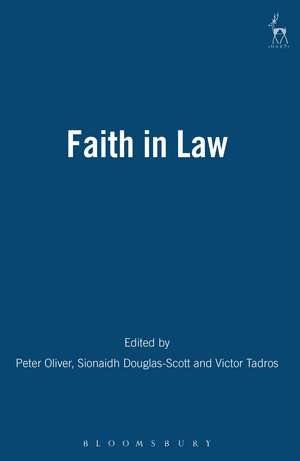Faith in Law: Essays in Legal Theory
Editat de Peter Oliver, Sionaidh Douglas-Scott, Victor Tadrosen Limba Engleză Hardback – 30 apr 2000
Preț: 538.03 lei
Preț vechi: 772.63 lei
-30% Nou
Puncte Express: 807
Preț estimativ în valută:
102.95€ • 107.78$ • 85.19£
102.95€ • 107.78$ • 85.19£
Carte disponibilă
Livrare economică 15-29 martie
Preluare comenzi: 021 569.72.76
Specificații
ISBN-13: 9781901362954
ISBN-10: 1901362957
Pagini: 160
Dimensiuni: 156 x 234 x 12 mm
Greutate: 0.41 kg
Editura: Bloomsbury Publishing
Colecția Hart Publishing
Locul publicării:London, United Kingdom
ISBN-10: 1901362957
Pagini: 160
Dimensiuni: 156 x 234 x 12 mm
Greutate: 0.41 kg
Editura: Bloomsbury Publishing
Colecția Hart Publishing
Locul publicării:London, United Kingdom
Caracteristici
This collection of essays explore the intricate relationship between law and faith. Faith in this context extends beyond religion to embrace the beliefs and practices which are at work alongside the familiar methods of law and legal reasoning.
Notă biografică
Peter Oliver is a Senior Lecturer in Law at the School of Law,King's College London.Sionaidh Douglas Scott is a Senior Lecturer in Law at King's College London.Victor Tadros is Lecturer in Law at the University of Edinburgh.
Cuprins
ntroduction - Peter Oliver, Sionaidh Douglas Scott and Victor Tadros1) Law as a Leap of Faith - John Gardner2) Living In and Out of the Law - Zenon Bankowski and Clair Davis3) Faith, Love and a Christianity to Come - Adam Gearey4) Reason and Religion - Timothy Macklem5) Faced by Faith - Anthony Bradney6) A Comfortable Inauthenticity: Post-Theological Law - Victor Tadros7) Faith and the State of Jurisprudence - Maleiha Malik
Recenzii
A set of challenging and exciting pieces of jurisprudential writingmust be on the essential reading-list for those who believe in laws ethical nature.
Descriere
This collection of essays explore the long-standing, intricate relationship between law and faith.
